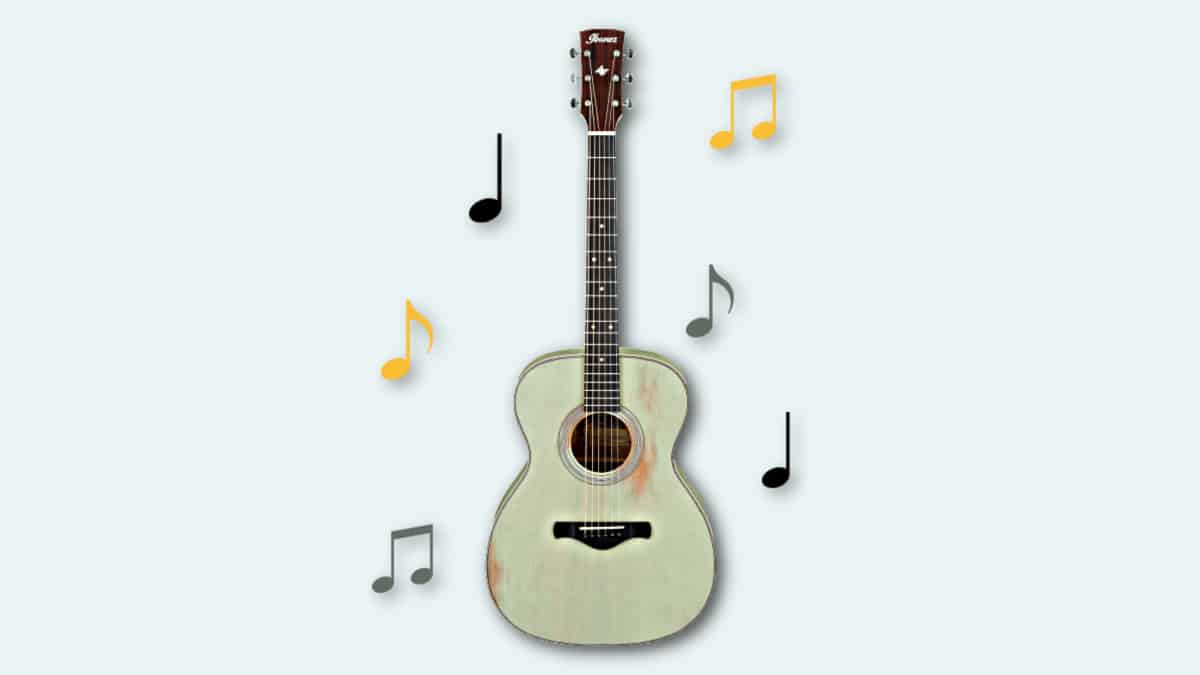Do acoustic guitars sound better with age?
Generally, yes, acoustic guitars do sound better with age. Over time, the sap in acoustic wood dries out. This leads to a harder wood that reverberates with a much more resonant tone and better sustain. But, there is one caveat. You must play the guitar often to hear any sort of tangible sound improvement. Additionally, it will take many years (think decades) to hear a difference.
It’s easy to fall in love with an acoustic guitar. After all, they boast full sounds, rustic tones, and have an elegant aesthetic. As a result, an acoustic guitar is one of the first instruments young musicians learn to play.
As a guitar player yourself, you may have read rumors circulating Reddit or other guitar forums about whether acoustic guitars change their sound over time. It all begs the question: do acoustic guitars sound better with age?
The quick answer is yes, they do sound better with age. Below, I’m diving into the science behind why your guitar’s sound evolves. I’ll also discuss if you can speed up the aging process and if some guitars age better than others.
Let’s dive in.
Why Do Acoustic Guitars Sound Better With Age?
If there’s one truth in life, it’s that the only constant is change. Fruit ferments to wine, metal rusts, copper turns green, and wood dries out.
Your acoustic guitar is no exception to the unrelenting movement of time. But how does an acoustic guitar change? And why?
The answer is simple and has to do with wood composition. The cell walls in wood contain gaps. These gaps hold moisture, but if kept in a dry environment, over time, those gaps collapse. Over a period of decades, the cells in the wood lose their ability to hold as much water as they used to.
Once those cell walls collapse (i.e., the wood dries), the wood hardens and pulls tighter. That tighter pull means the body will resonate with sharper, louder sounds.
Let’s think about it differently; let’s say you keep your guitar in a humid environment. Eventually, the moisture in the air soaks into the cells in the wood. These cells then expand, and the guitar becomes water clogged. As a result, your guitar will present a muffled, dull sound.
So, your acoustic guitar will sound better with age if it’s kept in the proper dry environment.
Another element is the guitar’s density. If you run your finger down your guitar, you’ll notice grains in the wood. All those grains contain sap inside them. The more you play, the more the body of your guitar vibrates. When the wood vibrates, all that sap breaks up and falls apart.
Once that sap has broken and fallen away, your guitar will play with bigger, fuller vibrations. Ultimately, you will hear a richer, deeper tone.
Do the Guitars Need to be Played?
There are a few caveats to having your guitar sound better with age the biggest caveat is that you must regularly play your guitar.
Why is this? Changing the density of the wood is vital to your guitar’s transformation. It’s as important as the drying process. For that density to change (aka, for the sap to break), you need to play it over many years consistently.
If you don’t, you won’t hear as much change in the sound from the drying phase.
The other important caveat is that you must take proper care of your guitar. Leave your guitar in dry environments, tune up your guitar, and don’t allow dust to accumulate.
I also want to note that the change in sound is gradual. How gradual? Chances are, you won’t hear the difference unless you listen back to a recording.
What Affects the Aging Process?
There are a lot of factors that affect your guitar’s aging process. Humidity levels, wood type, and wood quality are the top factors that affect the aging process.
And, as I mentioned earlier, how often you play also affects how fast your guitar ages – if at all. You can’t lock your guitar in its case for fifteen years and expect it to sound like a new instrument.
Can You Speed Up the Aging Process?
The aging process takes a long time. A long, long time. Most reports claim that it can take anywhere from twenty to forty years to hear a difference in sound. And with so many years, it’s only natural players try to find ways to speed it up.
There are varying opinions on what affects the aging process and if it’s possible to speed it up.
Some players attempt to speed up the process by putting their instruments in direct sunlight. I suppose they think that the sun exposure will zap away the moisture.
However, I recommend not doing this, as the heat can destroy your guitar’s body, and the UV exposure can drastically change the color of the wood.
Unfortunately, the only step you can take is to play your instrument as often as possible. The more vibrations the wood sustains, the more sap breaks away from the wood grains, and the better your tone will evolve.
Remember that even if you were to wait forty years, the changes to sound are very slight. Consider upgrading your guitar if you’re looking for big sound and tonal changes. More advanced models use higher-quality wood to give you that improvement you’re looking for.
Do Acoustic Guitars Decrease in Weight Over Time?
Yes, acoustic guitars do decrease in weight over time.
As you play your guitar, its wood loses sap in its grains and sheds moisture in its cell walls. Believe it or not, all that moisture and sap (though very minuscule) does have weight. If enough of that weight is lost, your acoustic guitar will lose weight over time.
But, like the sound changes, these weight changes are minor. If you’re playing your guitar daily, chances are high that you will not notice the weight changes. The only way you’ll know is if you weigh your guitar.
Do Certain Types of Acoustic Guitars Age Better?
Not all acoustic guitars are equal. Some brands use cheap plastic; some brands use high-end wood; most brands use wood somewhere in the middle.
As you can imagine, the differences in wood and materials mean that some acoustic guitars age better than others.
Guitars with high-end wood evolve to a much more complex sound. This is because quality wood dries much better than cheaper wood.
If you’re in the market for a new acoustic guitar and want the sound to evolve for decades, shop for higher quality. Brands like Taylor or Martin are companies you should keep a close eye on.
If you’re looking for something special, check out the Taylor 814ce. This guitar blends Mahogany, Ebony, and Indian Rosewood and ages into a rich, complex sound.
I love the complex sound of this high-quality acoustic guitar. Not to mention the nylon strings make it much easier on the fingertips. While this guitar is definitely an investment, you'll be enjoying the rich sound for years to come.
Do Laminate Guitars Sound Better With Age?
As a beginner player, you may not want to throw down too much cash on an expensive guitar. Because of this, laminate guitars are a great option for those looking to buy a more affordable instrument.
Laminate is a multi-layer synthetic product that mimics the appearance of wood. Because it’s plastic, laminate guitars are much more affordable to make. Thus, these guitars are affordable and have better durability than other acoustic guitars.
Unfortunately, those plastic cell walls don’t have the same gaps as wood cell walls. Because of that, the sound doesn’t change as it ages because the laminate composition does not change.
Additionally, there is no sap in the grains. Laminate gets the wood grains from print. So, no matter how much you play it, you won’t alter the sound on laminate guitars. Needless to say, your laminate guitar will sound the same on day one thousand as it did on day one.
Still, since the tonal changes are so minimal, there’s nothing wrong with buying a laminate guitar if you’re starting out. Instead of spending exorbitant money, choose a guitar that fits your current needs.
Do Electric Guitars Sound Better With Age?
While electric guitars do change in the same way as acoustic guitars change (since they too are made with work), the change doesn’t always make these instruments sound better. Actually, these subtle changes can make your electric guitar sound worse.
Let’s think about this for a minute. Your acoustic guitar relies on its body and its wood to project sound. Alternatively, your electric guitar uses pickups to create and project sound.
The pickups in your electric guitar are much more important to the sound than the wood and how the wood may change over time.
Still, that doesn’t mean you can’t hear a difference as time gets older. The more you play your guitar, the more you will learn its unique body. Over time, you will learn its sweet spots, frets, and playability, which translates to better sound.
Are Vintage Guitars Worth Buying?
For the experienced guitar player with a sophisticated ear, yes, vintage guitars are worth purchasing as the sound will be much more complex and evolved than a newer acoustic guitar.
However, bear in mind when purchasing a vintage guitar you likely won’t know its history. You won’t know where the vintage guitar was kept (in a humid or dry environment), how often it was played, if it was cared for during its time with its previous owner, and so forth.
Additionally, the tonal difference is very subtle, and vintage guitars cost quite a bit of money.
Still, vintage guitars generally sound more complex. Also, they usually have a worn, rustic look and are rich in history. Besides, who can say no to a cool vintage?
That’s It, Folks
So, yes, the sound of an acoustic guitar does change over many decades. If you play a guitar with high-quality wood, you’ll hear more of an improvement than with lower-quality wood.
Your acoustic guitar will develop a more complex, fuller sound as it ages if you keep it in a cool, dry environment, purchase wooden acoustic guitars, and strum your guitar on a regular basis.
However, make sure to keep your guitar in good condition and always keep it dry. For those who want to start with that complex sound, purchase a vintage guitar – just make sure you can speak to the owner to get a fuller idea of the guitar’s history.
FAQs
Do acoustic guitars sound louder over time?
In addition to your guitar’s sound and tone evolving, so too can your guitar’s volume. How is this possible? The answer again has to do with subtle changes occurring in the wood.
The more you play your guitar, the more its body alters. For example, the angle of the string break at the saddle can change. If you play it enough, you can warp the neck, and the finish will change. All of these factors change how your guitar projects sound. These subtle changes translate to a louder volume.
What makes an acoustic guitar sound great?
There are many aspects that can affect the quality of your acoustic guitar and how it sounds. Monitoring moisture levels and ensuring they’re low is one of the biggest ways an acoustic guitar can sound great; another way is to frequently change your strings, regularly clean it, and bring it in for tune-ups and adjustments.
How long should an acoustic guitar last?
It depends on the quality of the guitar. Typically a cheap acoustic guitar will last a maximum of 10 years, but a more expensive model could last a lifetime.







